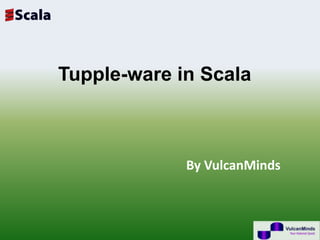
Tupple ware in scala
- 1. Tupple-ware in Scala By VulcanMinds
- 2. Tupple - Concepts Scala provides an interesting collection-like structure with 2 or more ‘Any’ type elements called Tupples which extends a Product. for e.g. ("Jane", "jane@jane.edu",24," Oregon, USA") is a tupple. scala> val y = ("Jane", "jane@jane.edu",24," Oregon, USA") y: (java.lang.String, java.lang.String, Int, java.lang.String) = (Jane,jane@jane.edu,24," Oregon, USA") The number of elements can be found by <tupple>.productArity for e.g. number of elements in Jane tupple is. scala> y.productArity res7: Int = 4 scala> val u = (100,200) u: (Int, Int) = (100,200) scala> u.productArity res6: Int = 2
- 3. Simple Scala hacks for Tupples Accessing individual members...... scala> u._1 res142: Int = 100 scala> u._2 res143: Int = 200 Scala Hacks ...... scala> 1->2 res79: (Int, Int) = (1,2) OR scala> val c = 1->2 c: (Int, Int) = (1,2) OR scala> val u = "Manish" -> 29 u: (java.lang.String, Int) = (Manish,29)
- 4. Scala hacks for Tupples - continued scala> 1->2->3 res80: ((Int, Int), Int) = ((1,2),3) OR scala> 1->2->3->4 res81: (((Int, Int), Int), Int) = (((1,2),3),4) OR scala> ("manish"->2) -> ("sandesh", 32) res106: ((java.lang.String, Int), (java.lang.String, Int)) = ((manish,2),(sandesh,32)) OR scala> val y = ("manish"->2) -> ("sandesh", 32) -> ("kat", 44) y: (((java.lang.String, Int), (java.lang.String, Int)), (java.lang.String, Int)) = (((manish,2),(sandesh,32)),(kat,44))
- 5. Applying Functions to Tupples A simple scala function with non-tupple parameter A simple scala function with a tupple scala> def product(x:Int,y:Int) = { parameter | x*y } product: (x: Int, y: Int)Int scala> def product2(x:(Int,Int)) = { | x._1 * x._2} scala> val ff = product _ product2: (x: (Int, Int))Int ff: (Int, Int) => Int = <function2> scala> val s = (100,200) scala> val h = ff(100,200) s: (Int, Int) = (100,200) h: Int = 20000 ----------------------------------------------------------------------- scala> val g = product2 _ Converting the function to a ‘tuppled’ type g: ((Int, Int)) => Int = <function1> scala> val fft = ff.tupled scala> g((100,200)) fft: ((Int, Int)) => Int = <function1> res147: Int = 20000 scala> fft((100,200)) res146: Int = 20000 *Note the function parameter passed is of type tupple (Int,Int)
- 6. Returning Tupples with variable number of elements scala> def compute(x:Int) = { | x match { | case 1 => (1,2) | case 2 => (1,2,3) | case _ => ("Unknown Number?",0) |} |} compute: (x: Int)Product with Serializable scala> val q = compute _ q: Int => Product with Serializable = <function1> scala> val e = q(1) e: Product with Serializable = (1,2) scala> val e = q(16) e: Product with Serializable = (Unknown Number?,0)
- 7. Playing with Null types in Tupples Playing with Nulls in tupples scala> val x = (200, null) x: (Int, Null) = (200,null) scala> x match { | case (i:Int, v) => println("got tuple (%s: %s)".format(i, v)) | case _ => println("catch all") |} got tuple (200: null)
- 8. Processing values in tupples processing values in tupples // a list of people with their names and gender and ages scala> val w = List(("manish","male", 22),("kat", "female",32),("Jose","male",30),("Obama","male",35),("Ken","male",44),("Hanna","female",21)) w: List[(java.lang.String, java.lang.String, Int)] = List((manish,male,22), (kat,female,32), (Jose,male,30), (Obama,male,35), (Ken,male,44), (Hanna,female,21)) scala> def countBoth(x:List[(String,String,Int)]) = { | var males = 0 | var females = 0 | for(person <- x) { | if(person._2 equals "male") males = males + 1 | else females = females + 1 |} | (males, females) |} countBoth: (x: List[(String, String, Int)])(Int, Int) scala> val q = countBoth _ q: List[(String, String, Int)] => (Int, Int) = <function1> scala> val result = q(w) result: (Int, Int) = (4,2) Isn’t that concise?
